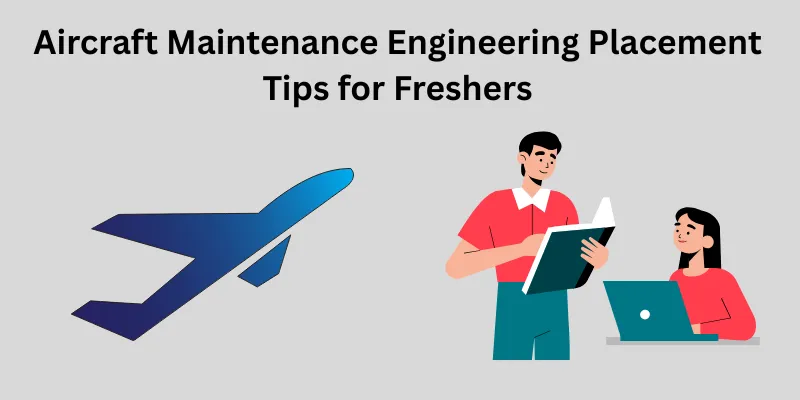

The aviation industry is growing fast, creating a high demand for skilled Aircraft Maintenance Engineers (AMEs). But with many freshers entering the field, competition is tough.
To secure a great placement, you need more than just technical knowledge — you must find ways to stand out and showcase your skills.
Building a career in Aircraft Maintenance Engineering (AME) starts with a strong foundation. Mastering core subjects like aerodynamics, avionics, and aircraft systems builds confidence for interviews and real-world tasks. Employers value candidates who understand concepts deeply, not just memorize notes.
The aviation industry is always evolving. AI tools, advanced materials, and digital inspections are reshaping maintenance. Staying updated through online courses, webinars, and industry news keeps your skills sharp and competitive.
By combining strong fundamentals with continuous learning, you set yourself up for success — from your first placement to long-term growth in this dynamic field.
Your resume is your first impression — make it strong! For AME freshers, highlight key certifications like DGCA or EASA to show credibility. Clearly list internships, practical training, and relevant projects.
Keep it clear, concise, and tailored to aviation roles, using bullet points for easy readability and job-specific customization.
Pro Tip: Use action words like assisted, maintained, or performed to make your experience sound strong and professional.
In Aircraft Maintenance Engineering, practical experience is as vital as classroom learning. Internships or on-the-job training let you apply knowledge to real tasks — from system checks to basic repairs. These opportunities build technical skills and confidence, making you more prepared and competitive for your first job.
Why does it make a difference?
Tips to find opportunities:
Pro Tip: Start applying early and be open to different roles. Every bit of experience adds value and brings you closer to your first job.
In the aviation industry, who you know can be as important as what you know. Building strong connections can open doors to job opportunities, valuable advice, and industry insights that freshers often miss.
Leverage LinkedIn
Build a strong profile showcasing your skills, certifications, and projects. Network with AME experts, recruiters, and airline HRs. Join aviation groups, engage in discussions, and share your journey to stay visible.
Attend Aviation Seminars and Events
Industry seminars, webinars, and conferences are perfect places to meet experts and learn about the latest trends. Carry a simple introduction and don’t hesitate to ask thoughtful questions — it leaves a positive impression.
Use Alumni Connections
Your college alumni network can be a goldmine. Reach out to seniors working in airlines, MROs, or training organizations. A simple message asking for guidance or tips can lead to valuable referrals or mentorship opportunities.
Why Networking Boosts Your Placement Chances
Networking makes you stand out in a competitive market. Recommendations from industry professionals help your resume get noticed and keep you informed about job openings. Building connections takes effort but brings lasting benefits. Start early, stay active, and let the right network shape your AME career.
Landing your dream job in Aircraft Maintenance Engineering (AME) doesn’t stop at clearing exams — your interview is where you truly shine. With the right preparation, you can answer confidently, show your skills, and leave a lasting impression on recruiters.
1. Common Technical Questions You Should Expect
Interviewers often test your core AME knowledge. Make sure you review:
Pro Tip: Practice explaining complex technical answers in simple terms. It shows clarity and confidence.
2. Typical HR Questions and How to Handle Them
Recruiters also want to see if you’re the right cultural fit. Prepare for questions like:
Answer Tip: Be honest, specific, and positive. Highlight examples from internships, college projects, or teamwork experiences.
3. Master Your Soft Skills and Confidence
Technical skills alone won’t land you the job. Recruiters look for candidates who can communicate well, adapt, and stay calm.
In aircraft maintenance, learning never ends. Staying certified and updated sets great candidates apart. DGCA and EASA certifications boost job opportunities by proving your skills and reliability.
But certification isn’t enough — with drones and AI transforming maintenance, staying informed helps you stay competitive in interviews and on the job.
Pro Tip: Enroll in short courses or online workshops to upgrade your skills. Even a simple certificate in drone technology or AI applications can help you stand out from other freshers.
Success in Aircraft Maintenance Engineering comes from continuous learning and adaptability. Stay updated, sharpen your skills, and embrace every opportunity to grow.
Remember, your dream AME job is just a preparation away — with the right mindset and effort, you can confidently take off toward a rewarding aviation career.